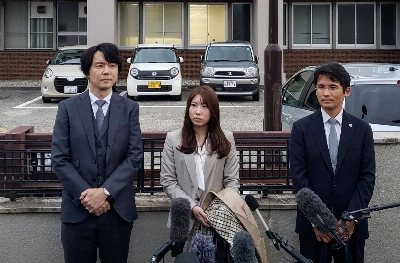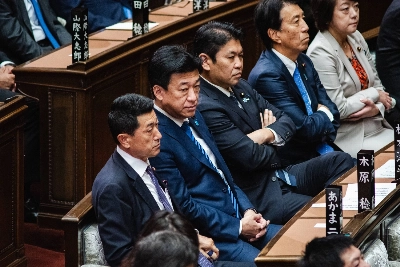Attempting to evaluate the state of our world is an absurdly complex task. Nevertheless, that is what the Worldwatch Institute has done every year since 1984, and has done once again this year with "The State of the World 2000."
The name, if not the contents, of this Worldwatch annual report will be familiar to many readers. Particularly in academic and environmental circles, the "State of the World" series is known for its broad coverage and sound analysis of the state of our planet.
Many who know the book, however, have never picked up a copy because they assume the news is bad, and they are right. The state of our world is far from rosy.
Still, bad news is only half the story. The purpose of the book is not to slap readers silly with endless depressing statistics. As the book's subtitle, "A Report on Progress Toward a Sustainable Society," suggests, the Worldwatch authors look at the problems we face, how we got where we are and how to get where we want to be. Good, responsible analysis without hype.
Even the chapter titles put a constructive spin on serious problems: "Nourishing the Underfed and Overfed," "Phasing Out Persistent Organic Pollutants" and "Harnessing Information Technologies for the Environment."
This does not mean the bad news is glossed over. From the first page of the book's foreword, the authors make clear that these are not the best of times, and the worst of times could be coming.
"The bright promise of a new millennium," the authors warn, "is now clouded by unprecedented threats to humanity's future.
Still, the clouds do not stop the authors from sketching out in considerable detail some prescriptions for a sunnier future. Courageous politicians and policymakers will find much to work with here, particularly in the chapter, "Creating Jobs, Preserving the Environment."
Even NHK is convinced. It purchased the TV rights for "The State of the World 1999," and is working with CNN and European networks on a series due out this year.
For more information on Worldwatch and its books, see www.worldwatch.org
Elsewhere, in Japan and abroad, there have been several encouraging events that bode well for positive change on the environmental front.
In February, Ralph Nader announced his bid for the Green Party nomination in the U.S. presidential race. Nader, a well-known consumer advocate and public interest lawyer, said he will campaign on "fundamental issues -- democracy, concentrated corporate power and the excessive disparities of wealth."
The U.S. Green Party platform focuses on environmental protection, economic justice, grassroots democracy and nonviolence. Nader is running on a "blue-green" agenda, with core labor standards and environmental safeguards central to his campaign.
"In 1996 I stood for election, this year I'm running," Nader said. "The American people deserve a debate on corporate globalization and its damage to democracy."
According to U.S. Greens, Nader's campaign could bring out voters and help the Democrats take back Congress. In the 1996 election, more potential voters did not vote than those that did. Nader could bring independents and young voters to the polls, although some in the Democratic Party do not relish the prospect of having to confront Nader and his progressive-populist campaign.
Nader, a Harvard-trained lawyer, has warned that "concentrated corporate power is on a collision course with democracy."
In 1996, during the Green Party's first presidential campaign, Nader received nearly 700,000 votes and finished in fourth place, despite limiting his campaign spending to under $5,000. In 2000, Nader plans to raise $5 million.
In a related development, the U.S. Greens Abroad have been officially launched in Japan. For more information, contact Richard Evanoff at [email protected] or see the new USGA Web site providing basic information on Greens and USGA: ultra1.misasa.okayama-u.ac.jp/w3/pru/usga/USGreens.htm
For those who missed The Japan Times March 4, Mitsubishi Corporation and the Mexican government have given up plans to build a large salt works in the Vizcaino Biosphere Reserve, Baja California, one of four breeding grounds for gray whales.
Mexican President Ernesto Zedillo said that after weighing the pros and cons of the project, the deciding factor was the "national and world importance and the uniqueness of the Vizcaino Biosphere Reserve." The government sees ecotourism as a much more appropriate and desirable development strategy for the region.
According to Reuters, the project faced "bitter opposition" from environmentalists who were concerned that the plant posed a threat to numerous species, including gray whales, sea lions, black sea turtles and prong-horned antelope.
Implying it was more the government's choice than Mitsubishi's, Mexico's Trade Minister Herminio Blanco said, "Mitsubishi totally supports the Mexican government's decision." Nevertheless, Mitsubishi got the message. It received about 700,000 protest cards and letters, according to James Brumm, Mitsubishi's U.S. director.
Joel Reynolds of the Natural Resources Defense Council called it "one of the most important environmental decisions in our generation, not just for Mexico but for the world."
Thank you Mexico and Mitsubishi, for doing the right thing -- this time.


















With your current subscription plan you can comment on stories. However, before writing your first comment, please create a display name in the Profile section of your subscriber account page.